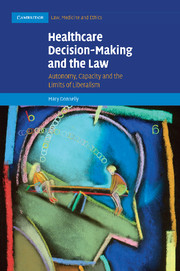Book contents
- Frontmatter
- Contents
- Acknowledgements
- List of cases
- List of legislation
- Introduction
- 1 Autonomy: variations on a principle
- 2 Autonomy in the law
- 3 Capacity: the gatekeeper for autonomy
- 4 Capacity assessment in practice
- 5 Autonomy, rights and decision-making for patients lacking capacity
- 6 Treatment for a mental disorder: a case apart?
- Conclusion
- Bibliography
- Index
- References
3 - Capacity: the gatekeeper for autonomy
Published online by Cambridge University Press: 04 February 2011
- Frontmatter
- Contents
- Acknowledgements
- List of cases
- List of legislation
- Introduction
- 1 Autonomy: variations on a principle
- 2 Autonomy in the law
- 3 Capacity: the gatekeeper for autonomy
- 4 Capacity assessment in practice
- 5 Autonomy, rights and decision-making for patients lacking capacity
- 6 Treatment for a mental disorder: a case apart?
- Conclusion
- Bibliography
- Index
- References
Summary
The previous chapter showed that, while the law may reject ‘hard’ paternalism, ‘soft’ paternalism (intervention on the basis of incapacity) remains a fundamental component of the law's approach to healthcare decision-making. As several commentators have pointed out, the operation of the capacity requirement may conceal ‘hard’ paternalism or favour societal interests over those of the individual in a way which may, in fact, be more damaging to a person's autonomy in practice that an overt recognition of limits on the right. Accordingly, an understanding of capacity is essential in order to appreciate what the principle of autonomy means at a conceptual level and how it operates in individual cases.
In adopting any principles in respect of capacity, the law makes normative choices. In the words of the United States President's Commission:
[A] conclusion about a patient's decisionmaking capacity necessarily reflects a balancing of two important, sometimes competing objectives: to enhance the patient's well-being and to respect the person as a self-determining individual.
This chapter examines the normative choices which have been made by the law in respect of capacity. It outlines the features of the current legal standard for capacity in England and Wales as set out in the Mental Capacity Act 2005 (MCA) and evaluates these in terms of consistency with the liberal principle of autonomy, which is recognised as providing the basis for the law in respect of healthcare decision-making.
- Type
- Chapter
- Information
- Healthcare Decision-Making and the LawAutonomy, Capacity and the Limits of Liberalism, pp. 90 - 130Publisher: Cambridge University PressPrint publication year: 2010



